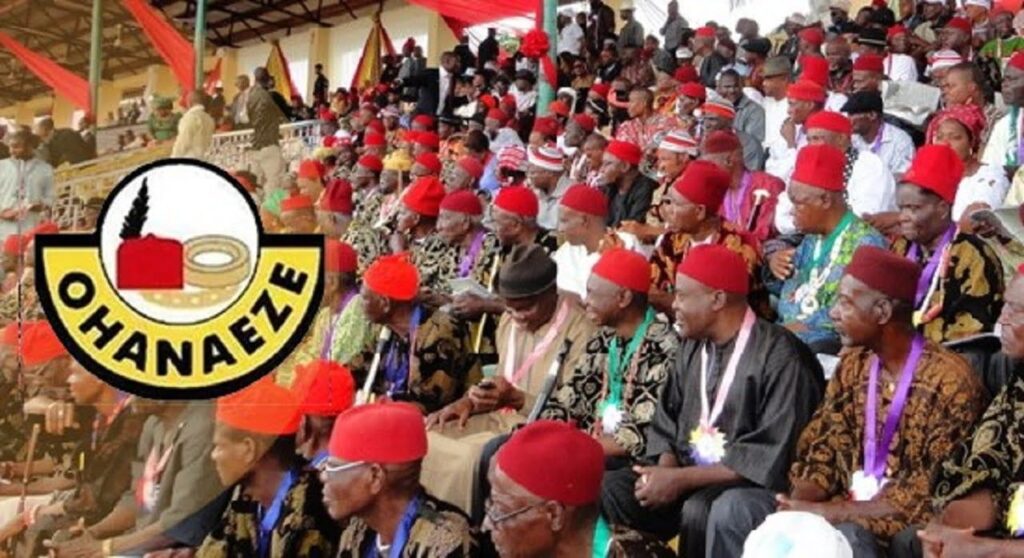Ohanaeze Ndigbo on Monday opposed former President Olusegun Obasanjo’s call to remove Professor Mahmood Yakubu as the Chairman of the Independent National Electoral Commission (INEC).
The Apex Igbo Sociocultural Organisation in a statement by its Secretary General, Mazi Okechukwu Isiguzoro, said the call is not only ill-advised but also politically motivated, lacking any substantive merit or ethical grounding.
It said: “Mr Obasanjo’s historical record as a leader overseeing Nigeria’s electoral processes reveals a troubling legacy. The elections conducted under his administration in 2003 and 2007 have been universally condemned as the worst in Nigerian history by local and international observers alike.
“These elections are etched in our memory as benchmarks of electoral malpractice, where the institutional integrity of INEC was severely compromised and the public’s trust in democratic processes eroded.
“It is indeed paradoxical for Mr Obasanjo to seek the removal of Professor Yakubu when his presidency played a pivotal role in institutionalizing irregularities and corruption within the electoral system.
“The troubling trajectory of INEC during Obasanjo’s tenure from 2003 to 2007 culminated in a third-term bid that ultimately failed, exposing the depths of political manipulation prevalent at the time.
“Former President Umaru Musa Yar’Adua’s candid admission post-election in 2007 that the electoral process was fundamentally flawed starkly underscores the urgency for reform—a mission he initiated before his tragic passing in 2010. His successor, Goodluck Jonathan, further expanded upon these reforms, emphasizing the necessity for integrity in our electoral framework.
“In this context, it is incumbent upon all citizens to recognize that Mr Obasanjo’s recent statements are thus laden with political undertones that undermine his credibility in advocating for electoral integrity today.”
According to Ohanaeze Ndigbo, it is fundamentally premature and ill-timed for anyone to call for the sack of Professor Yakubu while he is still in office, especially because his tenure is set to conclude in 2025.
“We advocate for a period of stability and completion of ongoing reforms, suggesting that discussions around the future leadership and structure of INEC should commence only after Yakubu’s term has expired.
“Our organization’s position on this matter is clear: Nigeria’s electoral reforms should be approached with a spirit of collaboration and foresight, particularly as we look toward the end of Professor Yakubu’s tenure. We expect that President Bola Ahmed Tinubu will take decisive and judicious steps toward transforming INEC, with the robust support of the National Assembly, thereby fortifying the electoral landscape in Nigeria for all citizens.
“Furthermore, we commend the advancements that INEC has made thus far under the leadership of Professor Yakubu. The implementation of the Bimodal Voter Accreditation System (BVAS) and the INEC Result Viewing Portal (IREV) during off-cycle elections in states such as Imo, Kogi, Bayelsa, Edo, and Ondo stands as a testament to a commitment to transparency and accountability.
“These developments have begun to restore public confidence in the electoral process, allowing for a more engaged and informed electorate. We have emphasized our unwavering commitment to promoting continuous electoral reforms in Nigeria—a mission that is crucial to restoring the faith of the Nigerian people in our democratic institutions.
“We advocate for a united approach among all patriotic leaders and citizens to demand reforms that transcend partisan politics and contribute meaningfully to the strengthening of Nigeria’s democracy. We urge all stakeholders to approach the delicate issue of electoral integrity with seriousness and diligence.
“Let us focus our efforts on constructive dialogue, enhanced cooperation, and the challenges we must overcome collectively rather than engaging in divisive rhetoric that ultimately detracts from the progress we seek,” it said.















